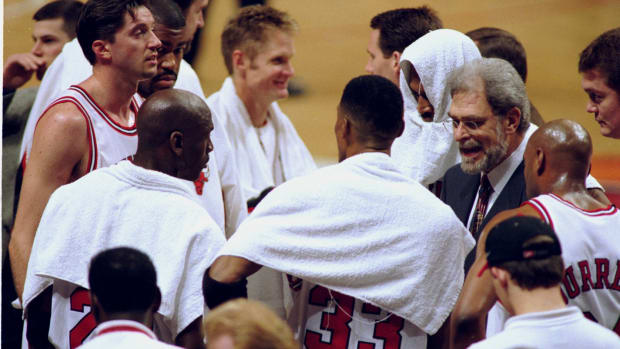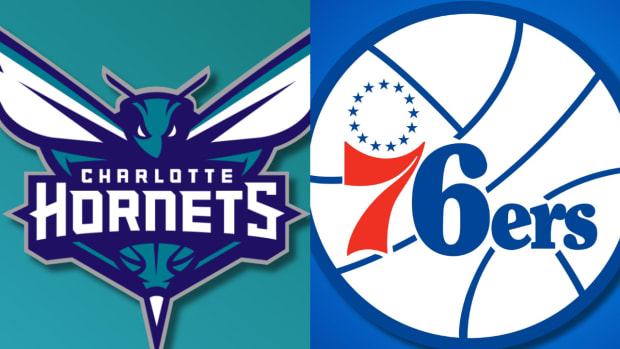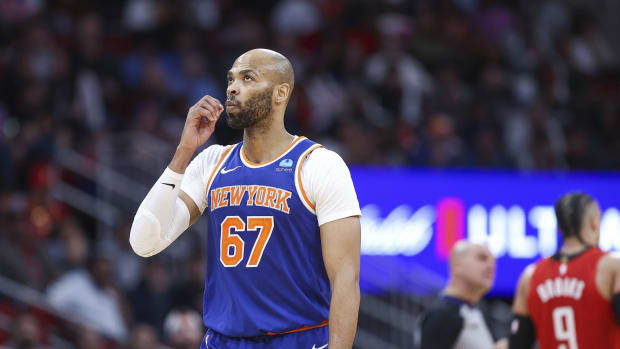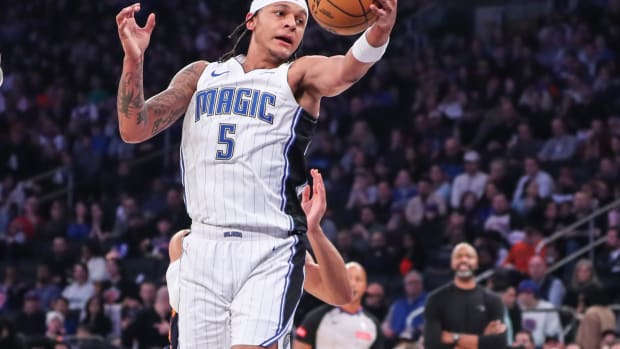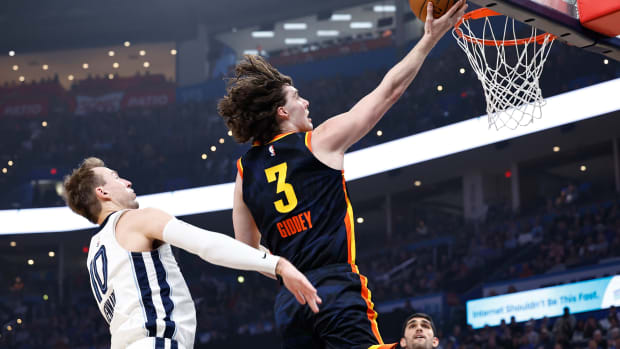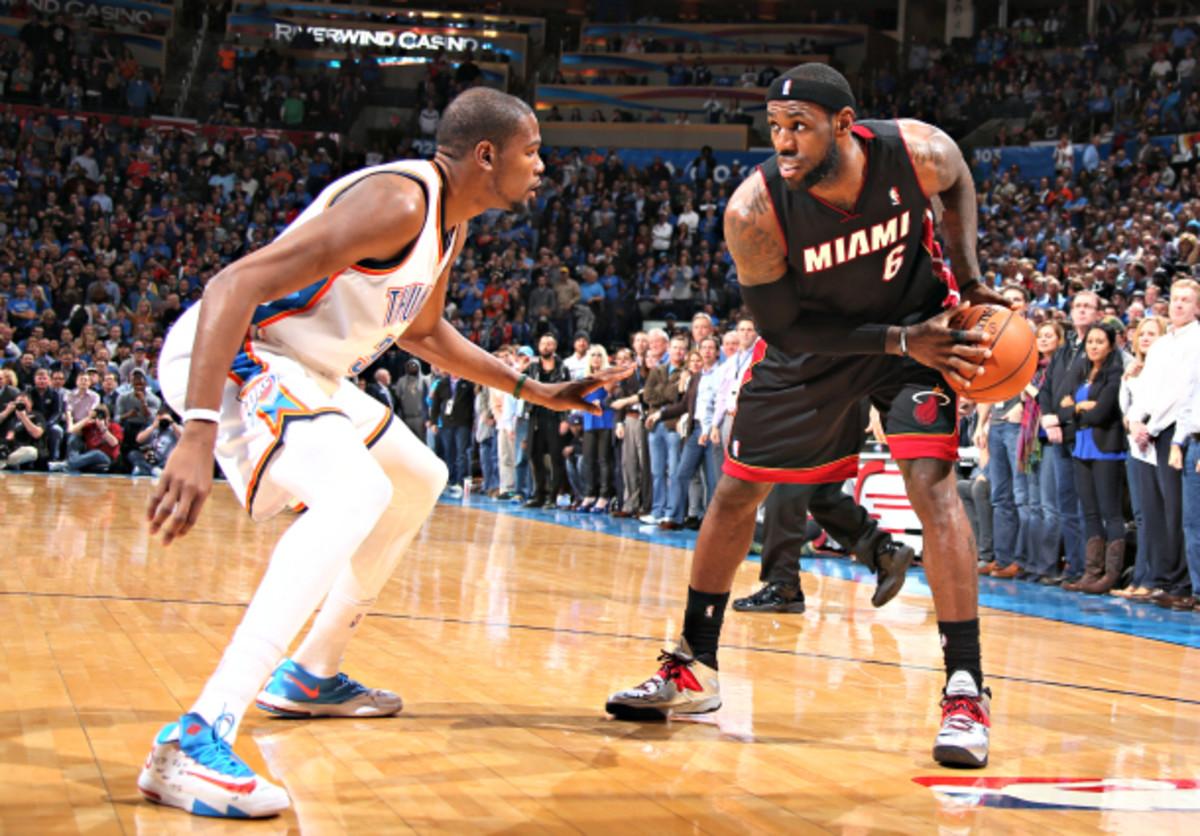
LeBron vs. Durant has company: The five tightest MVP races over the last 25 years
LeBron James (right) and Kevin Durant are battling game by game for the NBA's Most Valuable Player award this year. (Nathaniel S. Butler/NBAE via Getty Images)
Every passing week seems to bring new heat to the MVP race, which is shaping up to be a too-close-to-call verdict between LeBron James and Kevin Durant. The two are spiraling around and toward one another in a riveting display of one-upmanship, with a great performance from one motivating the other to similar heights.
As a result, the balance of the award seems to shift on a weekly basis. If that waffling persists, James and Durant could be closing in on one of the tightest MVP races in recent memory, if not in NBA history.
To set the stage for their photo finish, we've compiled the closest MVP voting margins of the past 25 years. Given that the size of the voting pool changes from year to year, the closest races were determined by comparing the percentage each candidate received of that year's maximum voting point total. Let's roll.
5. 1999: Karl Malone, Alonzo Mourning and Tim Duncan
It should come as little surprise that Michael Jordan's second retirement left something of a power vacuum in the MVP race. No other player in league history had so thoroughly dominated the game and the world of coverage that surrounded it, both of which matter for an award granted by the media. Without that definitive all-timer to anchor MVP ballots, votes were cast for Karl Malone, Alonzo Mourning and Tim Duncan in almost equal quantity.
The three power players were separated by less than 90 total voting points. Malone and Duncan had the same number (31) of third-place votes. More voters tabbed Duncan (36) for the second-place slot than Alonzo Mourning (32), though in the final count those positions were flipped. There were seemingly no right or wrong answers between the three, all of whom were highly productive two-way players on high-achieving teams.
''This is one of the closest ones I can remember, and I was back and forth all the way,'' Jackie MacMullan, then of Sports Illustrated, told the Associated Press in 1999. MacMullan voted for Malone, but not without recognizing the other candidates in her ballot's explanation:
While Alonzo Mourning has had a career year for Miami, and Tim Duncan has turned San Antonio into a bona fide title contender for the first time, Malone is still the toughest player in the league to guard and is the best player on the best team.
While the best-player-on-the-best-team criterion doesn't jibe with my personal interpretation of the MVP award, I might have defaulted to it as a means of breaking the tie between three incredibly qualified candidates. Otherwise, how could one weigh Malone's versatility against Duncan's ascendant brilliance and Mourning's team-saving influence in a way that would provide a definitive choice? This was a true split decision, worthy of a place on this list for all the right reasons.
4. 2002: Tim Duncan and Jason Kidd
This race featured two of the best at their respective positions in NBA history, both at or near their playing primes. The turnout could have been very different had Shaquille O'Neal played even a few more games for the Lakers (he appeared in only 67), but Jason Kidd and Tim Duncan were both well worthy of consideration.
Kidd was a recently acquired point guard who somehow created an Eastern Conference powerhouse in New Jersey out of Kenyon Martin, Kerry Kittles, Keith Van Horn, Todd MacCulloch and Richard Jefferson -- basketball alchemy at its most astounding. Duncan formally took over the Spurs from a declining (and injured) David Robinson while also establishing order on a functionally new team.
"We surrounded Tim with new players at the one, two and three positions and told him to make it work," Spurs coach Gregg Popovich told Sports Illustrated in 2002. "And he did."
That he did. Duncan's Spurs won 58 games behind elite defense and sturdy offense. They lost to the Lakers in the playoffs, but so, too, did Kidd's Nets. Such was the fate of any team unfortunate enough to face the Lakers in the early 2000s, no matter its individual star power. Duncan and Kidd could only do so much against a dominant center, not to mention the outstanding shooting guard and the all-time-great coach who flanked him. O'Neal earned enough points to register as a solid third, but it was Duncan and Kidd who fought, deadlocked, for the NBA's top individual honor.
For Sports Illustrated, Chris Ballard explained why he preferred Kidd:
Beyond the assists (9.9 per game, second in the league at the All-Star break), rebounds (7.1) and scoring (14.3), these are the numbers that explain why Kidd received 20 votes: Last season the Nets finished 26-56; thanks to Kidd's leadership New Jersey was an Eastern Conference-best 32-15 through Sunday. The last time the Nets were this much fun to watch, the team played with a red-white-and-blue ball. Kidd's abysmal 37.7% shooting prompted some to vote for Shaq (who was second with seven), but when you can dominate on both ends of the court without taking a shot — as only Kidd can — that's a minor deficiency.
For ESPN.com, David Aldridge made his case for Duncan:
It's Duncan over Kidd for a few reasons. One, you'd probably take Kidd's cast of finishers...over Duncan's. Duncan was San Antonio's finisher. Second, Duncan had to carry his team for most of the season while David Robinson struggled to regain his form and Bruce Bowen and Danny Ferry missed significant time with injuries. Moreover, Duncan had to do all this with a rookie point guard from France who was himself out of the lineup for a month. Third, while Kidd's impact on the Nets as a passer is obvious, Duncan was, through Sunday, top six in the league in five different categories: scoring (25.5 per game, fifth), rebounds (12.7 per game, second), blocks (2.41, fourth), minutes (40.7, sixth) and double-doubles (65, first).
3. 2005: Steve Nash and Shaquille O'Neal
Historically, MVP voters have flocked to candidates of transformational quality -- those players who, with their addition to a struggling team, make a roster whole. Steve Nash was just that for the Suns in 2004, when Bryan Colangelo landed the perfect point guard for Mike D'Antoni's scheme.
Thus began what would become one of the NBA's most beautiful partnerships and thus formed the foundation for its most improbable run of back-to-back MVP awards. Both of Nash's most valuable nods have been questioned plenty since, but there's only so much room to wiggle around the fact that Phoenix's offense erupted with his arrival. This wasn't some modest change; the Suns improved by 13.1 points per 100 possessions in Nash's first season, and his impact could not have been more obvious.
There are playmakers who contribute subtly, who are demanding of careful study to fully appreciate. Nash has some of that same texture to his game, but his style has always been rather loud: shocking passes, impossible finishes and pull-up three-pointers. He was in full effect for a 62-win team, actualized in a way he never was in Dallas.
From Jack McCallum in Sports Illustrated (2005):
A scouting report left in the visitors' locker room at America West Arena offers the stock pursed-lip rebuke to Phoenix's style. It read, in part, "The Suns will run off misses, makes, out-of-bounds plays, half-court out-of-bounds plays, tip plays, anything. There is literally nothing that is frowned upon." The emphasis was added by Phoenix coach Mike D'Antoni, who related the story of finding the report (he won't say for the record which team had written it), which has become a source of both amusement and motivation. "[The scout] was more or less saying we just roll the balls out there and let 'em play," says D'Antoni. "But I remember frowning at least once or twice this season. I just can't remember at what."
He certainly grimaced during a stretch last month in which Nash missed all or most of four games with a left thigh bruise and back spasms. The Suns dropped all four and averaged only 86.3 points while 22-year-old center Amare Stoudemire, who was shooting 58.2%, hit only 37.8% during that stretch. Phoenix needs Nash as desperately as People needs Brad and Jennifer--the little guy on the end is the front-runner for MVP. "We can run without Steve," says forward Shawn Marion, "but he makes us want to run. We just do it better when he's out there. And we know we have to run to be good."
Looking back, it's something of a miracle this race was so close. It's hard to overcome that kind of narrative heft, and yet O'Neal -- in his first season after being traded from the Lakers -- managed to close the gap by leading a historically underrated Heat team. At that point, Dwyane Wade was already a star, but a supporting one; O'Neal's impact on both ends helped the Stan Van Gundy-coached Heat to become one of the most balanced teams in the league, undone only by a seven-game series against the ever-formidable Pistons. This would be O'Neal's last real chance at the MVP, as Wade caught up to him the following season and age soon thereafter.
2. 1997: Karl Malone and Michael Jordan
This may well be the most infamous MVP race in the history of American sport, as a fully established Michael Jordan was denied the award in a textbook example of voter fatigue. To be clear: Jordan had taken a step back in the 1996-97 season. At 33, he was no longer explosive enough to meet his previous statistical highs. That said, he was still Jordan -- as willful as ever, fresh off a season that saw him crowned as both MVP and a champion, and a class above most every other player in the league.
Malone, though, was a credible challenger aided by circumstance. With Jordan being held against his own standard, Malone had one of the best seasons of his career. He was a prolific scorer and rebounder for the 64-win Jazz, and by the numbers very nearly as instrumental for Utah as Jordan was for Chicago. His case is self-evident, and very much meets the general sense and spirit of the award. But true to the recurring theme of Malone's career, Jordan was better. Malone knew it, just as he knew months in advance that Jordan's Bulls would likely get the best of him. From Jackie MacMullan in Sports Illustrated (1997):
Jazz forward Karl Malone knows Michael Jordan will win the league MVP trophy again. He also concedes that the Bulls will win the NBA championship, unless, he says, "a team like us can play the way we did during that stretch when we won 15 in a row" from early November to December.
There are certain things you come to accept when you're 33 and you're in your 12th year with Utah, a small-market franchise that is consistently excellent yet repeatedly falls short of a championship. For instance, even though you've averaged 26.1 points and 10.8 rebounds per game for your career, you know that fans voting for the Western Conference All-Stars will bypass you in favor of Sonics forward Shawn Kemp, 27, who brings down the house with his rim-rattling dunks. And even if you've led your team to the best record in the West and been its leading scorer in 29 of the last 32 games, as Malone had through Sunday, you know the chances of taking the title of best player from Jordan are remote.
But the title is one thing and the MVP another. Jordan's Bulls had the clear edge on the hardwood, as they would prove by defeating the Jazz in the NBA Finals. But the unsuspecting Malone had been terrific enough to steal narrative goodwill from the most popular athlete in NBA history. That might seem impossible in retrospect, but all it took was an outstanding season from another exceptional player, coupled with a bit of burnout from the media firestorm of a post-comeback Jordan.
1. 1990: Magic Johnson, Charles Barkley and Michael Jordan
The closest MVP vote in NBA history is also its weirdest. This is the sole occasion in which the player who received the most first-place votes did not win the award. In that, Charles Barkley likely has the most valid MVP gripe ever. The debate over whether Magic, Charles or Michael most deserved the award would rage into infinity, but the league-sanctioned voters chose to reward Barkley. He had nine more first-place votes than Magic, which at the time accounted for one-tenth of the voting pool.
Having a five-deep pool of reasonable candidates threw off the entire tabulation, though. Malone and Patrick Ewing grabbed votes -- three for first, nine for second and 21 for third between them -- that likely should have belonged to Barkley or Jordan. What's even weirder: Three voters omitted Jordan, in the midst of an incredible season, from their ballots.
"I guess I can understand an anti-Jordan sentiment," Jordan told the Chicago Tribune in 1990."There are going to be some rotten apples in every barrel. Three rotten apples."
Jordan was right to be bitter. Unlike Johnson or Barkley, he was a fearsome defender -- so much so that he was voted first team All-Defense in the previous two seasons and would be selected again in 1990. He led the league in points and steals per game, and in retrospect we know that he bested all players that season in win shares and Player Efficiency Rating. No player, Barkley included, used more of his team's possessions in 1990 than Jordan, and yet for all that shot creation Jordan still ranked in the top 15 in true shooting percentage with an amazingly low turnover rate. His was one of the great statistical seasons of all time, and yet the majority of his votes came as a third-place candidate.
"I really wrestled with it," said Shaun Powell, then of the Miami Herald, "because I saw it as more of a personal preference than, 'Is this guy better than that guy?' I mean, who in their right mind can say that Barkley is better than Jordan? I voted for Charles because I thought he had grown as a player -- passing, scoring and rebounding -- and during the regular season, I think he grew as a person, being more civil to his teammates."
There's a clear case to be made for Johnson as well, given the responsibility he shouldered for the Lakers after Kareem Abdul-Jabbar's retirement. He had more talent around him (James Worthy, Byron Scott, Vlade Divac, Mychal Thompson and Michael Cooper) than either Jordan or Barkley did at that point, but Johnson shifted around to play every position that season -- a flexibility that led Peter Vecsey of the New York Post to describe him as "a human Scrabble blank." One of the best players in NBA history rode off into the sunset, but with Abdul-Jabbar's departure came slightly improved offense, steady top-10 defense and a Magic-propelled 63-win season.
"If I had to vote for it right now [in May 1990], I might vote for Jordan," said Fred Kerbert, then of the New York Daily News. "It was that close. If Magic was off the Lakers, they'd still win 40. If Jordan was off Bulls, I doubt they could find the bus. But Magic just played every position this year. And they had the best record in the league. If that sounds like a paradox, it is."
Photo credits: Andrew D. Bernstein, D. Clarke Evans, Brian Drake, and Barry Gossage/NBAE via Getty Images
Voting results courtesy of Basketball-Reference.com and the Association for Pro Basketball Research. Infographics via Piktochart.
[si_video id="video_5BC0E3AC-A5D0-529E-DE63-97DE512CC61F"]




































